
GCED Basic Search Form
Quick Search
Close
当前位置
相关资源
The Current Situation of the Russian Language in the Central Asian States (Journal of Post-Soviet Studies; vol. 3, no. 3)
出版地 | 出版年份 | 页数:
Moscow | 2020 | p. 250-270
ISBN/ISSN:
ISSN 2618-7426 (online)
地区:
亚太地区

The article examines the current situation of the Russian language in the five Central Asian states of Kazakhstan, Kyrgyzstan, Tajikistan, Turkmenistan, and Uzbekistan, which appreciate the sovereignty they have gained, elevating their own language policies to the level of a manifestation of national independence and a symbol of sovereignty. The status of the Russian is no longer a simple question of language, but a complex political issue. The author shows that the attitudes of the five Central Asian states toward the Russian language can be divided into three main categories: acceptance, resistance and uncertainty.
资源网址:
资源类型:
研究论文 / 学术期刊文章
主题:
多样性 / 文化素养 / 包容性的
其他
教育水平 :
非正规教育
其他
